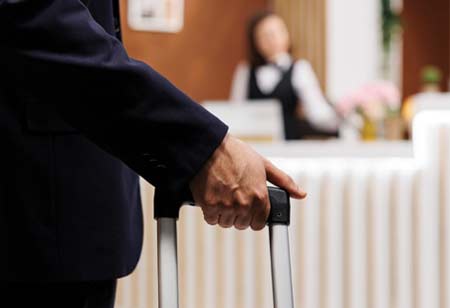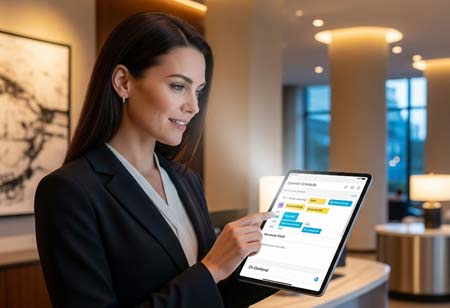Thank you for Subscribing to Hospitality Business Review Weekly Brief
Trends in Hospitality for a Competitive Advantage
Adopting emerging trends like AI, automation, and contactless services helps hospitality businesses enhance customer experiences, streamline operations, and maintain a competitive edge in a competitive market.

By
Hospitality Business Review | Thursday, September 04, 2025
Stay ahead of the industry with exclusive feature stories on the top companies, expert insights and the latest news delivered straight to your inbox. Subscribe today.
FREMONT, CA: The hotel sector is constantly growing due to shifting customer tastes, technological advances, and an emphasis on sustainability. Understanding and utilizing the most recent advancements is essential to preserving a competitive edge, whether in the form of customized visitor experiences or the integration of artificial intelligence. By monitoring these trends, hospitality businesses may improve operational efficiency, satisfy client expectations, and produce memorable experiences that set their brand apart in a competitive market.
Hospitality developments are driven by various factors, with trends often reflecting customer behaviour shifts, new service models, or technological advancements. For example, the rise of artificial intelligence and machine learning has increased their use in customer service, while virtual reality has transformed how hospitality companies market their offerings. Broader global events have also shaped trends, emphasising hygiene, safety, and a focus on local markets. Additionally, growing concerns about climate change have led many businesses to prioritise eco-friendly solutions, further influencing the direction of the industry.
Key Hospitality Trends Hoteliers Should Be Aware Of
Chatbots in Hospitality
Chatbots have become a significant trend in the hospitality industry, particularly in customer service. They provide immediate responses to customer inquiries, even when staff is unavailable, helping to resolve issues on the first point of contact. Additionally, chatbots can gather essential information and pass it along to human staff if needed. This is particularly useful when addressing customer concerns regarding specific issues like health protocols or restrictions, as they can instantly provide relevant information, reducing stress for guests and employees.
ChatGPT in Hospitality
ChatGPT is transforming the hospitality sector by powering custom-built chatbots for businesses such as hotels and restaurants. This technology enables multilingual customer support and enhances the guest experience by offering personalised services. ChatGPT can analyse data to improve marketing campaigns, predict trends, and deliver tailored experiences, making guests feel valued. This technology helps streamline operations, cut costs, and boost overall customer service in the industry.
Contactless Payments
Contactless payments have become part of a more significant push to reduce friction in the hospitality industry. Methods like Apple Pay and Google Pay have simplified the payment process by allowing customers to complete transactions without the need for cash or PIN entries. The pandemic further accelerated the demand for such solutions as customers and staff became more cautious about handling cash. The growing adoption of contactless payment systems has become a key feature of the modern hospitality experience.
Automation in Hospitality
Automation in the hospitality industry helps streamline various operational processes with minimal human intervention. This includes using chatbots, automated check-ins, billing systems, and temperature controls. Automation improves efficiency, reduces human error, and enhances the guest experience. It allows businesses to manage their operations behind the scenes better while focusing on providing high-quality service to guests.
Bleisure Travel
The trend of bleisure travel, which combines business and leisure, has seen significant growth in the hospitality sector. This trend targets business travellers who take advantage of their trips to enjoy leisure activities in their downtime. Bleisure travellers tend to stay for shorter periods but are often high spenders. This segment provides a unique opportunity for hospitality businesses to encourage repeat visits by offering experiences that blend work and relaxation.
Changing Guest Expectations
Guest expectations are constantly evolving and influenced by technology and competitive pressures. As customers demand more personalised and digital experiences, businesses must adapt to these changes. Meeting evolving expectations ensures firms maintain a strong reputation and continue attracting bookings. Offering mobile-optimised websites, seamless digital touchpoints, and personalised services are now essential elements in meeting the expectations of modern guests.
Workstations
The rise of remote work and digital nomadism has led to workstations where guests blend work and leisure. These travellers require reliable internet and amenities suited for both work and relaxation. Hospitality businesses can attract workers by providing facilities catering to professional and personal needs, thus opening up opportunities for year-round bookings, including during off-peak seasons.
Voice Search and Control
Voice search is becoming an increasingly important tool for customers booking hotels and restaurants. Hospitality businesses need to ensure their websites are optimised for voice search results. Additionally, voice control technology in hotel rooms enhances the guest experience by allowing them to interact with their environment without touching physical surfaces. This innovation makes the guest experience more convenient and reduces the potential spread of germs.
Robots in Hospitality
The use of robots in hotels and restaurants is an exciting development within the broader trend of automation. Robots are being deployed to greet guests, provide information, and even assist with room service and cleaning. This trend supports efforts to reduce human-to-human contact, a priority in the wake of the pandemic, and helps streamline operations, particularly in settings where minimising direct interaction is essential.
By adopting innovations such as ChatGPT-powered chatbots, voice search, and robots, hospitality providers can enhance guest experiences, streamline operations, and meet the evolving expectations of modern travellers. Staying ahead of these trends helps businesses optimise efficiency and also ensures they can deliver memorable, personalised experiences that keep customers coming back in an increasingly competitive market.







